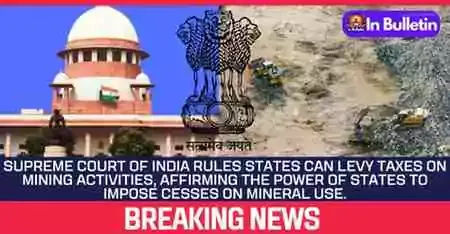In a landmark decision, the Supreme Court of India has clarified that royalties paid by mining operators to the Central government are not considered a tax, and that States possess the authority to impose tax on mining and mineral-use activities. This decision, delivered by a nine-judge Constitution Bench, significantly impacts the regulation of mining activities across India.
Key Highlights of the Judgment
The Bench, led by Chief Justice of India (CJI) DY Chandrachud and comprising Justices Hrishikesh Roy, Abhay S Oka, BV Nagarathna, JB Pardiwala, Manoj Misra, Ujjal Bhuyan, Satish Chandra Sharma, and Augustine George Masih, issued the majority opinion with Justice Nagarathna dissenting. The Court held that the Mines and Minerals (Development & Regulation) Act (Mines Act) does not strip States of their power to impose taxes on mineral rights.
CJI Chandrachud, delivering the majority judgment, stated, "Royalty is not in the nature of tax... Payments made to the government cannot be deemed to be a tax merely because a statute provides for its recovery in arrears." This ruling overturns the 1989 judgment in India Cement Ltd vs. State of Tamil Nadu, which had previously held that royalty was a form of tax.
Implications for State Legislatures
The ruling empowers State legislatures under Article 246 read with Entry 49 of List 2 in the Indian Constitution to tax mineral-bearing lands, asserting that the legislative power to tax mineral rights lies with the State legislature. The Court ruled that the Parliament does not have the legislative competence to tax mineral rights under Entry 50 of List 1, which is a general entry.
Justice Nagarathna's Dissent
Justice BV Nagarathna, in her opinion, argued that royalty is in the nature of a tax and that States lack the legislative competence to impose any tax or fee on mineral rights. She maintained that the 1989 India Cement decision was correctly decided and that allowing States to levy taxes on mineral use would lead to double taxation, which could hinder mineral development in the country.
Future Implications
The Supreme Court has scheduled a clarification hearing on July 31 to determine whether the judgment will have a prospective effect or impact past transactions. This aspect is crucial as the verdict has significant financial and regulatory implications.
Conclusion
The Supreme Court's decision is crucial for development in the regulation of mining activities in India. By delivering the powers of State and Central governments, the Court has provided clarity on the legislative competence concerning the taxation of mineral rights. This ruling not only impacts the mining industry but also sets a precedent for future legislative and judicial actions in related matters.
For further updates and detailed analysis, stay tuned to our trusted coverage on this evolving issue on "In Bulletin".




